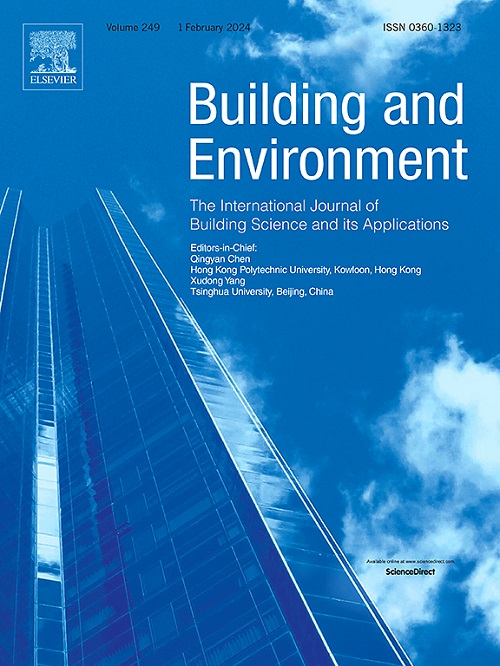An economic room-level thermal management of air-cooled cloud data centers based on human brain emotional intelligence
IF 7.1
1区 工程技术
Q1 CONSTRUCTION & BUILDING TECHNOLOGY
引用次数: 0
Abstract
Cloud Data Centers (CDCs) are consistently recognized as pivotal in the digital economy due to their provision of flexible and cost-effective solutions for storing and processing large volumes of data. These facilities enable businesses to adapt to evolving demands, support advanced technologies, and facilitate global collaboration by offering instant access to resources. Consequently, ensuring their reliable and uninterrupted operation remains a primary concern for technology enterprises and service providers. Among the various factors influencing the performance of CDCs, thermal conditions are of particular significance. In this context, a novel Brain Emotional Learning-Based Intelligent Controller (BELBIC) is proposed in this paper for room-level temperature regulation of an air-cooled CDC. Unlike other established controllers, the proposed BELBIC is both intelligent and adaptive, thereby exhibiting superior performance and adaptability to the dynamic conditions of CDCs. To evaluate the efficacy of the proposed approach, it has been implemented in an air-cooled CDC comprising two server clusters across four distinct weather seasons. The performance of the proposed BELBIC is subsequently benchmarked against four existing controllers, with comparisons based on heat cost. In Cluster 1, Brain Emotional Learning-Based Intelligent Controller (BELBIC) reduces costs by approximately 94.00% to 95.72% compared to Fractional Order Proportional Integral controller (FPI) and Fractional Order Proportional Integral Derivative controller (FPID), and by about 71.13% to 72.47% compared to Proportional Integral Derivative controller (PID) and Proportional Integral controller (PI). Similarly, in Cluster 2, BELBIC achieves cost reductions of around 93.84% to 95.65% versus FPI and FPID, and approximately 70.51% to 72.26% versus PID and PI. The results demonstrate that the proposed model surpasses the others by achieving reduced heat costs and faster thermal regulation, attributed to its intelligent and adaptive features.
基于人脑情商的经济型气冷云数据中心房间级热管理
云数据中心(cdc)一直被认为是数字经济中的关键,因为它们为存储和处理大量数据提供了灵活且经济高效的解决方案。这些设施使企业能够适应不断变化的需求,支持先进技术,并通过提供对资源的即时访问来促进全球协作。因此,确保其可靠和不间断的运行仍然是技术企业和服务提供商的主要关注点。在影响cdc性能的诸多因素中,热条件尤为重要。在此背景下,本文提出了一种新的基于大脑情绪学习的智能控制器(BELBIC),用于风冷CDC的室内温度调节。与已有的控制器不同,本文所提出的BELBIC具有智能和自适应的特点,对cdc的动态条件具有优异的性能和适应性。为了评估所提出的方法的有效性,它已在一个气冷CDC中实施,该CDC包括四个不同天气季节的两个服务器集群。提出的BELBIC的性能随后与四个现有控制器进行基准测试,并基于热量成本进行比较。在集群1中,基于大脑情绪学习的智能控制器(BELBIC)与分数阶比例积分控制器(FPI)和分数阶比例积分导数控制器(FPID)相比,成本降低了约94.00%至95.72%,与比例积分导数控制器(PID)和比例积分控制器(PI)相比,成本降低了约71.13%至72.47%。同样,在集群2中,与FPI和FPID相比,BELBIC的成本降低了约93.84%至95.65%,与PID和PI相比,BELBIC的成本降低了约70.51%至72.26%。结果表明,由于其智能和自适应特性,该模型在降低热成本和加快热调节方面优于其他模型。
本文章由计算机程序翻译,如有差异,请以英文原文为准。
求助全文
约1分钟内获得全文
求助全文
来源期刊

Building and Environment
工程技术-工程:环境
CiteScore
12.50
自引率
23.00%
发文量
1130
审稿时长
27 days
期刊介绍:
Building and Environment, an international journal, is dedicated to publishing original research papers, comprehensive review articles, editorials, and short communications in the fields of building science, urban physics, and human interaction with the indoor and outdoor built environment. The journal emphasizes innovative technologies and knowledge verified through measurement and analysis. It covers environmental performance across various spatial scales, from cities and communities to buildings and systems, fostering collaborative, multi-disciplinary research with broader significance.
 求助内容:
求助内容: 应助结果提醒方式:
应助结果提醒方式:


